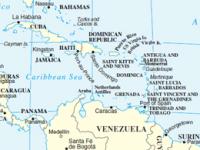Although the Caribbean as a region has the second highest HIV prevalence after sub-Saharan Africa, most countries have concentrated epidemics which disproportionately affect certain groups including gay men and other men who have sex with men (MSM). In many countries men who have sex with men experience considerable social stigma and are not reached with vital HIV prevention, treatment, care and support services. Not only are men afraid of disclosing their sexual activity, they are also deterred from finding out what they need to know to reduce their risk or to buy condoms.
An environment of homophobia is often reinforced by anti-sodomy legislation which exists in 11 of 16 Caribbean countries*. This can contribute to an intolerant cultural and social environment which risks keeping men who have sex with men away from accessing HIV testing and counselling and education services that would reduce the vulnerability to HIV infection.
In Jamaica—a country with anti-sodomy laws—there is 32% HIV prevalence among MSM, versus 1.6% in the general population. In Trinidad & Tobago and Guyana, countries which also criminalize sex between men, the HIV prevalence ranges from 20% to 32%. While in Cuba, Suriname, the Bahamas, Dominican Republic, countries without such legislation, the HIV prevalence in MSM ranges from 1% to 8%.
According to 2007 UNGASS Country Progress reports less than 40% of MSM in the Caribbean are reached by prevention programmes. Local groups in many countries in the Caribbean have been urging civil society and government programmes to include MSM issues and organizations within the AIDS response. These efforts have been supported by regional networks including PANCAP.
UNAIDS Executive Director Michel Sidibé has called for an end to punitive laws which hamper the AIDS response in this region.
Reducing homophobia and removing punitive laws that criminalize sex between men creates the right conditions for achieving universal access.
UNAIDS Executive Director Michel Sidibé
“In most of the countries in the Caribbean that don't have repressive laws, HIV prevalence is between 1% and 8% among men who have sex with men,” said UNAIDS Executive Director Michel Sidibé. “This contrasts sharply with a range of between 20% and 32% in countries which outlaw sex between men.”
“Reducing homophobia and removing punitive laws that criminalize sex between men creates the right conditions for achieving universal access,” Mr Sidibé continued.
A collaborative effort is underway between UNAIDS, UNDP and PAHO/WHO to develop strategies for Latin America and the Caribbean on human rights and improvement of access to health services for MSM and other sexual minorities.
UNAIDS will lead a regional effort in the Caribbean to strengthen HIV prevention programmes among these groups, to bring together the human rights and service provision components for their improved health, human rights and well-being.
* Countries in the Caribbean with laws that criminalize men who have sex with men: Antigua and Barbuda, Barbados, Belize, Dominica, Grenada, Guyana, Jamaica, Saint Kitts and Nevis, Saint Lucia, Saint Vincent and the Grenadines, Trinidad and Tobago. Countries in the Caribbean with no laws criminalizing men who have sex with men: Bahamas, Cuba, Dominican Republic, Haiti, Suriname. According to ILGA web site accessed 16 March 2010




